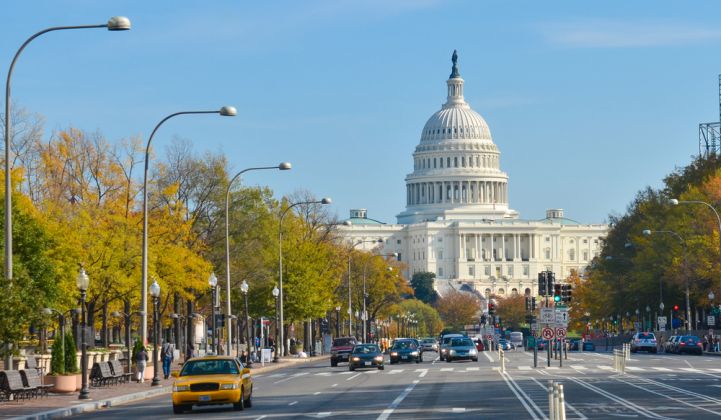Rhone Resch, president and CEO of the Solar Energy Industries Association, is spending this week meeting with Republican members of Congress to champion an extension of the federal solar Investment Tax Credit (ITC).
Without an extension, the 30 percent solar ITC will step down to 10 percent for utility, commercial and leased solar systems, and will drop to zero for customer-owned projects.
SEIA is advocating for a five-year ITC extension with "commence-construction" language that would allow projects under early development to qualify.
That's a big ask. But Resch said the group is also being pragmatic by working with lawmakers to extend the credit in whatever form is most viable, speaking via webcast on Wednesday at GTM's Solar Market Insight conference.
“You’re not going to see small standalone legislation go forward at this point; it’s going to be bigger stuff, and mostly, we’re going to have the ability to add tax to it,” said Resch.
There are four big pieces of legislation slated to pass in the coming months that could host a tax extension.
One option is to attach a tax extenders package to the highway bill, which needs to pass by November 20. Another option is attach to a customs bill that’s designed to streamline trade enforcement.
A third option is to include a tax extenders package in an omnibus appropriations bill. Congress must pass some type of budget agreement before the current continuing resolution ends on December 11.
However, the best chance to get a multi-year extension and commence-construction language added into the tax code is likely to come in 2016, when Congress is expected to consider lifting the U.S. oil export ban.
“This may be our best opportunity…because as Republicans are looking at lifting the ban on crude oil exports, Democrats are saying, 'We need to get something for it,' and the White House is chiming in too,” said Resch.
The House is only considering a one-year tax extenders package that would be retroactive for 2015, and the Senate is considering a two-year bill that would run until the end of 2016. So in both cases, lawmakers are not looking very far forward, which could push the ITC down the list of priorities.
“Our big challenge is to make sure that we’re considered germane and that they’re willing to deal with our tax credits before they expire,” said Resch.
Admittedly, it will be tough to get solar included in the House bill, he added. But on the Senate side, SEIA already has a commitment that Senate Finance Committee Chairman Orrin Hatch (R-Utah) will back a commence-construction clause.
Is a separate scenario, newly selected House Speaker Paul Ryan could take up the solar ITC as part of his campaign for broad tax reform.
“There are a lot of behind-door discussions going on now, a lot of jockeying,” said Resch. “Our whole goal here is to make sure our Republican champions who are going to be in the room know very specifically what’s going on in our industry and how important these extensions are."
Resch met with four Republican senators to request their support on Wednesday, after addressing the conference. By the end of the week, he expects to have 10 to 13 Republican senators backing the ITC extension and making their case to Senate Majority Leader Mitch McConnell (R-Ky.). SEIA has also lined up a handful of Republican supporters in the House.
All but one Democrat have already said they back an ITC extension, said Resch. So by winning over more Republicans -- especially top Republicans that will hammer out big pieces of legislation behind closed doors -- the solar industry stands a decent chance at success.
When pressed to name the odds, Resch said that getting language passed on commence construction is better than 50-50. And most likely, that will play out in an appropriations bill.
If lawmakers lift the oil export ban, the odds of getting both a multi-year extension and commence-construction language go up significantly, he added. However, that scenario isn’t likely to play out until next year.
If nothing happens until mid-2016, it will become far less likely that Congress will pass solar ITC language before going on summer recess and returning to campaign during the election season. At that point, the solar industry would look to get something passed retroactively.
With more than 200,000 employees in the solar industry today, Resch said he would stress job creation as a top reason for extending the credit. “At the end of the day, that is what makes a difference in Washington.”



